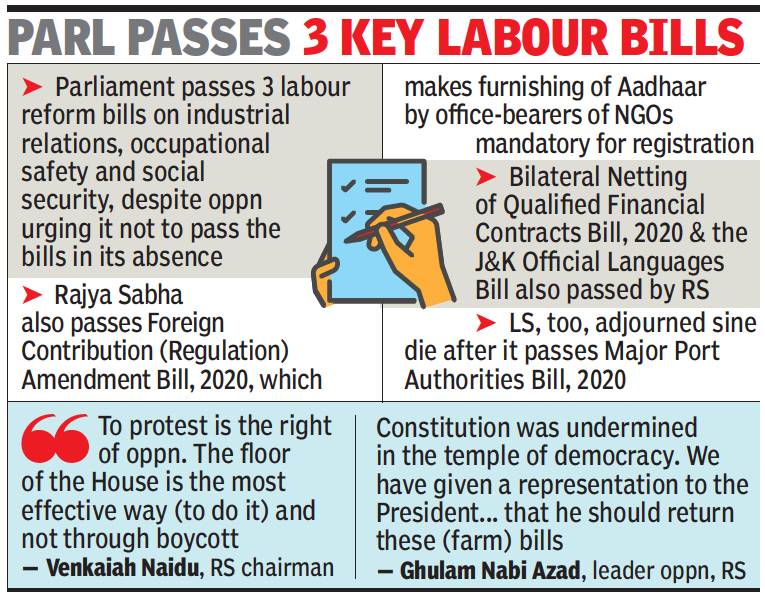The 17th Lok Sabha: 2019-24
This is a collection of articles archived for the excellence of their content. |
2020
Monsoon session
September 24, 2020: The Times of India

From: September 24, 2020: The Times of India
4th-shortest RS monsoon session ends 8 days ahead of schedule
25 Bills Passed, 6 Introduced In 10 Sittings
With over 30 members of Parliament and several more staffers testing positive for coronavirus, the monsoon session was curtailed on Wednesday with both Houses managing to hold only 10 sittings instead of the 18 that were scheduled between September 14 and October 1.
With this, the 252nd session of the Rajya Sabha got the distinction of being the fourth shortest among 69 monsoon sessions held so far, since the upper House was established in 1952. “In the 10 sittings, 25 bills were passed and six bills introduced,” RS chairman Venkaiah Naidu said.
According to RS secretariat’s publication ‘Rajya Sabha Statistical Information 1952-2018’ and official records, the other monsoon sessions of the House that were even shorter were the 110th session held in July 1979 and the 187th session in October 1999, both of which had only six sittings each.
Overall, the shortest RS session had only one sitting on August 20, 1979, as former PM Charan Singh quit the same day, leading to the fall of the Janata Party government. The 89th session of the House held during July-September 1974, in contrast, holds the record for the longest monsoon session yet, with 40 sittings. Of the 69 monsoon sessions so far, only four, including the one that ended, finished with 10 or less sittings.
25 bills passed, 16 introduced in LS during monsoon session
So far, 16 sessions have had between 11 and 20 sittings each, 40 sessions had between 21 and 30 sittings, while nine sessions had between 31 and 39 sittings.
This year too, with extraordinary preparations in place, the monsoon session of Parliament was scheduled to hold 18 sittings, with the Houses meeting even over the weekends from September 14. However, the presiding officers, the government, and opposition parties agreed to curtain the session in light of the rapid spread of coronavirus, and with close to 60 MPs and staffers getting infected just before and during the session.
However, both Houses of Parliament recorded 100% productivity, despite the protracted disruptions on the penultimate day and a boycott by opposition parties on the last day of the session.
Lok Sabha spent 68% of its sittings — over 60 hours — during the 10-day period on legislative business. Overall, while 16 bills were introduced in Lok Sabha during the monsoon session, the lower House passed 25 bills, including the farm bills, the three labour code bills, a legislation that approved a 30% reduction in salary, allowances and pension of MPs and the freeze for two years on their MPLAD funds, the Banking Regulation (Amendment) Bill and the Taxation and Other Laws (Relaxation and Amendment of Certain Provisions) Bill, among others.
While question hour was suspended in this session, members raised 370 issues during Zero Hour. The proceedings of the House also included 40 statements by various ministers, including those on coronavirus, on minimum support price for agri produce and the prevailing situation on the Ladakh border.
Record productivity
Mini LS session saw record productivity, September 25, 2020: The Times of India
Adjourned sine die eight days ahead of its scheduled duration, the curtailed monsoon session of Lok Sabha witnessed a record 167% productivity with several key bills passed, although the opposition walked out of the proceedings on the last day in protest against the fracas that took place in Rajya Sabha.
Lok Sabha passed 25 bills and 16 were reintroduced as the government had laid out its agenda of getting the bills cleared, many of them ordinances. While 37 hours were scheduled in the 10 sittings that took place in 10 days without a single break, the House worked for over 60 hours, including weekends. While 68% of the time was for legislative business, the remaining was used for Zero Hour and debates.
Speaker O P Birla said, “This session was being held under unprecedented times, am glad that all members rose to the occasion and placed their duties as public representatives on their topmost priority.” In Zero Hour, 370 MPs raised issues. As many as 181 issues of public importance were raised via Rule 377 and 855 papers tabled by ministers. Out of 78 women MPs, 60 spoke during the 10 day proceedings. Besides, 2,300 unstarred questions were answered by the government.